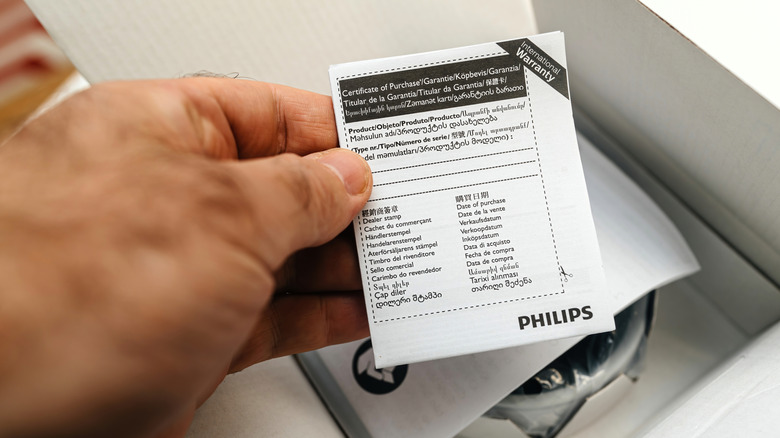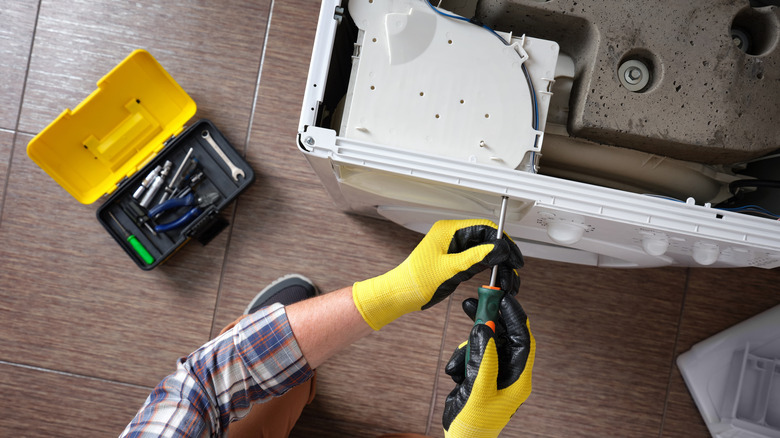Which Is Better For Your Appliances — Warranties Or Protection Plans?
Appliances range in prices and sizes, from a small coffee maker to a larger refrigerator. And these must-haves are not just for the kitchen, but for almost every room in your house. Many of these home essentials can cost you a pretty penny, which makes sense why you may have a dilemma deciding if you should replace or repair that appliance. But before you take any next steps, you need to see if your tool has some kind of protection in place, whether that is the original warranty or a policy you purchased. But as you think about the best way to protect these investments, you may be wondering which is better for your appliances — warranties or protection plans?
And honestly, it just depends. Each option has its own pros and cons when it comes to fixing up your appliances. Most warranties are free, but don't cover accidental damage or misuse, while protection plans cost extra, but are more versatile. If deciding between paying for an extended warranty or protection plan, the latter is your best bet.
Your decision can also be swayed, depending on the type of appliance you have, like a luxury or pricey piece. In most cases, appliances will have some sort of manufacturer's warranty that covers standard issues with craftsmanship and materials, whereas a protection plan is an extra security option that helps with accidental damages, wear and tear, and breakdowns.
Warranties are added to cover the manufacturer's craftsmanship and materials
Typically, most trustworthy and reliable appliance brands provide a warranty that lasts 90 days to a couple of years, covering mechanical and electrical issues from regular use, faulty installation from the brand's service team, and defects in products and materials. These concerns must come from normal usage problems and not from accidental damage. To know the time frame for your belongings, read the product manual for information about the type of warranty, what it covers, and who you should contact. You also have a legal right to read a warranty before purchasing to ensure it is something you want. Some companies require you to register your item before getting help, so it's best to get that done right after buying.
There are many types of warranties, including limited and full. At checkout, you may be asked if you would like to purchase an extended warranty. This is an extra protective option that you usually pay an upfront fee for. If you purchase with a credit card, your credit card company may instantly extend the warranty. However, if you need to file a claim on an extended warranty, you may have a hard time reaching a representative or incur additional hidden costs. Unless noted, these warranties don't usually cover cosmetic concerns, installation issues from outside contractors, accidental problems, wear and tear, breakdowns, and environmental damage, leading you to want an added protection plan.
Protection plans can be bought and added for accidental damages, wear and tear, and breakdowns
Protection plans, sometimes confused with extended warranties, can also be purchased for additional safeguarding for your appliances, especially from accidental damages, wear and tear, and breakdowns. Scratches, dents, and other cosmetic issues are usually covered on many service plans. Constant and improper use of household appliances makes them more likely to break down. That's where a protection plan comes into play, being able to offer repair services for more expensive fixes, and replacements for smaller items that can't necessarily be repaired at a cost-efficient price. While it varies, some claim companies include additional useful support, such as maintenance or technical help, partial reimbursement, power surge coverage, payback rewards, and even replacement costs for specific items, like food. Read the full details or contact support for a list of their inclusions.
Many people purchase these plans to save money in the long run. However, there are some issues that can come with these purchased plans, including specific exclusions or limitations and confusing terms and conditions. Due to these exclusions, some companies deny claims. It's also important to note that protection plans are not a type of insurance policy. Since it is an additional plan, you have to keep up with the paperwork and information. It's best to keep it in a safe spot, possibly next to the appliance's user manual, or find a plan that covers multiple items.


